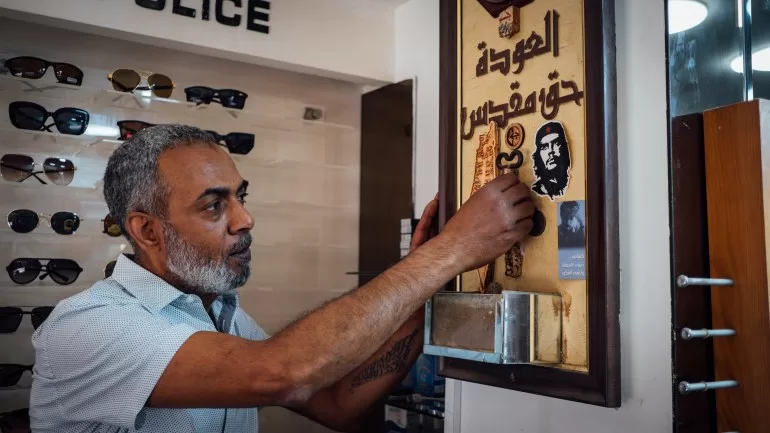Amman, Jordan – David Ben-Gurion, Israel’s first prime minister, believed that the memory of the Nakba, or “catastrophe”, would eventually fade for the hundreds of thousands of Palestinians violently expelled from their homeland by Zionist militias in 1948.
In 1949, a year after the State of Israel was created, he is reported to have said: “The old will die and the young will forget.”
It’s a prediction that amuses Omer Ihsan Yaseen, an erudite 20-year-old optician and third-generation Palestinian refugee living in Jordan’s capital, Amman.
“We will return, I am sure of that,” he says firmly as he points at a thick iron key that once opened the heavy-set doors to his grandparents’ stone house in Salamah, five kilometres east of Jaffa, now part of Tel Aviv in Israel.
The key takes pride of place in a homemade shrine-like display dedicated to Palestinian identity that hangs on the wall of his family-run optician, next to a display of designer sunglasses and spectacles.
It contains a collection of memorabilia, including lumps of sand and soil smuggled in from the Gaza Strip and Jaffa by family friends over the years.
Omer’s father, Ihsan Mohamad Yaseen, picks up some Jaffa soil with a gentle reverence, allowing it to run through his fingers into a small bowl.
The family’s home was burned down during the first Arab-Israeli war (May 1948 – January 1949), the 58-year-old explains, but the key remains an heirloom and stands as a symbol of resistance and the right of return.
Ihsan has lived all his life in al-Wehdat, a chaotic, bustling Palestinian refugee camp located in the Hay al-Awdah suburb of southeast Amman.
The camp was one of four set up in Jordan after the Nakba to house tens of thousands of Palestinian refugees but has long outgrown itself and now melts seamlessly into the surrounding areas of southeast Amman.
Like many Palestinians who have lived their whole lives in these camps, Ihsan still sees it as a temporary solution before his family can return to their homeland.
He takes long breaths as he recalls the memories passed down by his parents. Behind him, pictures of Palestinian intellectuals line the walls, including the poet and authors Mahmoud Darwish and Ghassan Kanafani.
Ihsan’s vivid descriptions paint a picture of a family living in a close-knit community that would while away the evenings in their home’s traditional inner courtyard, singing and dancing and surrounded by fruits, including the world-renowned Jaffa oranges, that flourished in the temperate Mediterranean climate.
The happy memories fade into ones of violence after the Haganah, a Zionist paramilitary force, tore through the village.
He pulls out a walking stick that belonged to his mother, engraved with the words of a song titled Oummi (My Mother).
Aseel Yaseen, Ihsan’s amiable 28-year-old daughter, joins her father and brother as they clasp the cane and belt out an impromptu sing-a-long.
Ihsan continues, but his words falter, and his eyes reveal a deep generational trauma.
Clenching the key firmly in his fist, he says that the local authorities had told his parents that they could return in a week, once the violence had ended, so they grabbed their key, packed some bags and left for the Gaza Strip.
“I don’t know who sold our homeland. But I saw who paid the price”
A week turned into 19 years before the family were uprooted once again when Israel seized the remaining Palestinian territory in the 1967 War, an event also referred to as the “Naksa”, meaning setback or defeat.
Ihsan’s mother, who was six months pregnant, was forced to walk from Gaza with him to Amman, an exhausting monthlong trek that took her through the sweltering heat of the Negev desert.
